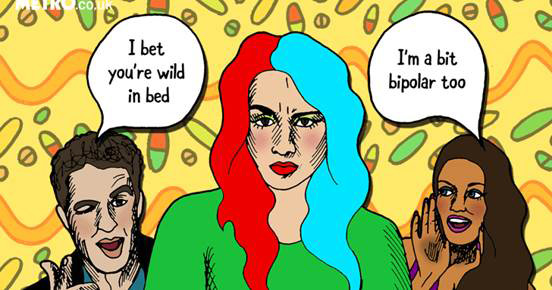If you suffer from a bipolar disorder, there is a high likelihood that someone has said at least 1 of these 5 comments to you at some point in your life. Similarly, you yourself might have mentioned one of these comments to someone who is diagnosed with a bipolar disorder. Of course, you may have not said it maliciously, but these words can be painful, and frustrating to receive.
1. “You’re being dramatic over nothing”
Being “dramatic”, or expressing oneself considerably has many different definitions when someone suffers from bipolar. On one hand it can mean responding to something with a very disparaging, or depressive outlook, or on the other hand it could be answering someone with extreme elation or irritability. It’s important to remember that individuals with this disorder are not being “dramatic” or “overreacting”. Sometimes it’s quite literally the illness taking hold of the person and making them express themselves in opposite extremes.
2. “You’re just having one of your mood swings”
A very common misconception is that people with a bipolar disorder experience “mood swings”. Let us start this off with normalizing a “mood swing” a bit. Everyone on this planet will at some point experience a moment or day where they are so stressed that it feels as if their emotions are “swinging” or shifting back and forth, but this is NOT the same as a Bipolar diagnosis. People that suffer from bipolar have distinct incidents for multiple days where they are experiencing episodes of extremely high exhilaration and euphoria, or severely low despondency, sorrow, and misery. Additionally, these episodes are typically separated by recognizable timeframes. What this means is that individuals with bipolar who are experiencing a true manic episode are not going to plunge into depression during mania. The words “mood swing” is thrown around a lot, but there is a large difference between experiencing changes in mood within the same day, and experiencing episodes of high elation, or low depression.
3. “Everyone is a little bipolar sometimes”
This comment has a lot of insensitive overtones. Playing down a bipolar disorder can be very disrespectful and insensitive to someone who has experienced the disastrous effects of a manic and depressive episode. Feeling anxious, stressed, or as if your emotions are all over the place is not the same as having a disorder that causes significant impairment in various domains.
4. “But you don’t seem crazy”
Essentially what this comment is mentioning is that “you look too normal to be psycho”. If anyone were told this, they would feel destroyed and hurt. Having a bipolar disorder does not mean someone is crazy, deranged or nuts, it means someone is suffering from a mental health condition. Many different people across the world have a bipolar disorder, but they are not going to brand it on their clothing as a trophy, no, they cope with it in a healthy manner. They understand that it does not define them, but that it can be debilitating and exhausting. If someone opens up and lets their guard down about about their mental health condition don’t reply with “but you seem so normal”, that person is just trying to cope with their condition and have a normal empathetic conversation.
5. “I wish I was manic”
Mania is one of the episodic extremes experienced in bipolar, and yes it can lead to high energy, and euphoria, but it also constitutes racing thoughts, reckless experiences, difficulty sleeping, distractibility, overly talkative, irritability, and risky behavior. So yes, you might wish to be more energetic, or feel happier, but that is not a diagnosable disorder. Imagine feeling such an extremely high potency of energy and euphoria that you are not able to function in social, familial, vocational, educational, and personal settings. People don’t want to be around you, your family doesn’t want to interact or deal with you, you have a higher chance of being admitted to a hospital, and the depression that comes after the crash is at times unbearable. So, do you still wish you were manic?
Disclaimer: The information in this blog post, including but not limited to, text, graphics, images, and other materials contained on this website are for informational and entertainment purposes only. No material on this channel is intended to be a substitute for professional medical advice, diagnosis, or treatment. Always seek the advice of your physician or other qualified health care provider with any questions you may have regarding a medical condition or treatment and before undertaking a new health care regimen, and never disregard professional medical advice or delay in seeking it because of something you have read or seen on this website or its affiliated social media sites and channels.
To learn more about options at Segal Trials, visit our Enrolling Studies.


